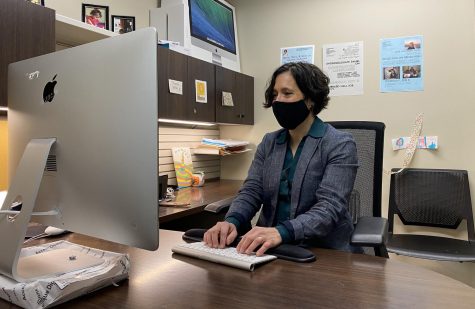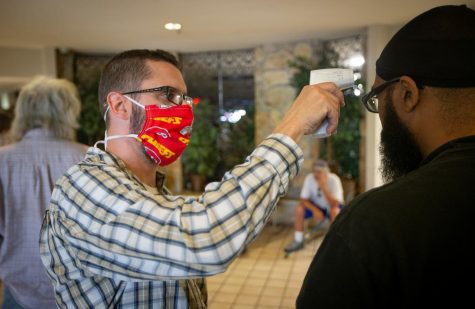Wichita State officials decline interviews, defer to letter about enrollment
Rick Muma’s “Letter to the Editor” is the only university response offered to The Sunflower in attempts to follow up on our coverage of Wichita State’s enrollment that appeared in print and online Monday. Muma is the senior associate vice president for academic affairs and strategic enrollment management.
In that story, The Sunflower documented how, in the two weeks leading up to the official enrollment tally — after losing pace with last year’s student headcount — WSU enrolled 668 non-degree-seeking students in free, half-credit-hour badge courses and then reported the largest enrollment increase of any four-year university in the state.
The Sunflower reached out to Muma, President John Bardo, Vice President for Strategic Communications Lou Heldman, Vice President for Student Affairs Teri Hall, university relations, the WSU Board of Trustees, the WSU Foundation, other members of strategic communications, the admissions office, and several members of faculty senate. Those who responded either declined to comment or deferred to Muma’s letter to the editor.
Muma declined to be interviewed for this story.
Anna Lanier, director of operations for President Bardo, responded to The Sunflower’s request for comment from the president.
“My understanding is that Rick Muma … is working on a letter to the Editor to address the original article,” Lanier said.
Heldman did not respond to an email request for comment.
Hall said in an email, “The person you should really get a comment from is Dr Rick Muma.”
University relations also deferred to Muma.
The office manager for the board of trustees, Susan Johnson, said Andy Schlapp is responsible for the board of trustees, and he was traveling Wednesday. Schlapp is the executive director of operations for the board.
Johnson did not respond to The Sunflower’s request for her to forward our questions to other members of the board, and no one else from the board contacted The Sunflower by press time.
“The University supports the statements made by Rick Muma in his letter to the editor sent to the Sunflower earlier,” said Shelly Coleman-Martins, associate vice president and chief marketing officer for strategic communications, in an email.
Lynn Deckinger, director of marketing and communications for the WSU foundation, thanked The Sunflower for contacting her for an interview, but declined to comment.
“We do not believe that we are the best resource for this follow-up story,” Deckinger said.
The Sunflower asked each of these university officials if they thought the last-minute enrollment of 668 non-degree-seeking students in free, half-credit-hour badge courses was a conscious effort to skew the enrollment numbers in a positive fashion for WSU and whether they thought it was best practice to continue to count people enrolled in half-credit-hour badge courses as students in the future.
The Sunflower scheduled a tentative interview with Bobby Gandu, director of university admissions, which he later cancelled.
“I’ll be deferring this request for a unified university response,” Gandu said, referring to Muma’s letter to the editor.
Matt Keith, spokesperson for the Kansas Board of Regents, said regent universities, such as WSU, may include any student enrolled in a course with credit — such as WSU’s half-credit-hour badge courses — in its headcount, regardless of degree-seeking status.
“However, we do not see fall semester enrollment numbers as the most accurate way of capturing systemwide participation,” Keith said. “As we noted in the news release that we sent last week with the 20-day headcount, academic year enrollment is a much better metric for analyzing systemwide participation.”
The Sunflower reached out to administrators at the University of Kansas, Fort Hays State, and Kansas State, three other universities governed by the board of regents who reported enrollment numbers to the state last week.
KU and Fort Hays State did not respond to requests for an interview by press time. But K-State did.
Like WSU’s badge program, K-State’s professional and personal development program is aimed at engaging non-degree students. Unlike WSU, however, K-State does not count such students towards enrollment because their classes are not offered for credit.
Pat Bosco, vice president for student life at K-State, said he could not comment on another university’s enrollment procedure, specifically, but that the academic integrity of K-State prevented it from counting students in the Professional and Personal Development program towards overall enrollment.
“The integrity of our numbers have always been historically important to us,” Bosco said. “It’s just not something we would consider — it’s not on our radar. We don’t need to do that.”
K-State reported a decrease of 984 students in its 20-day headcount last week.
Kimberly Moore, director of WSU’s workforce, professional, and community education program called WSU “pioneers” in the realm of for-credit badges, but Bosco said K-State will not follow suit any time soon.
“It’s not how we do business at K-State,” Bosco said.

Chance Swaim was the Editor in Chief of The Sunflower from fall 2017 to spring 2018.
Swaim was a graduate student in the English Department working...

Matthew Kelly is a former editor-in-chief and managing editor for The Sunflower. Kelly graduated in 2020 with a bachelor’s degree in political science...

















Fake Pres. Bardo • Oct 10, 2017 at 3:54 pm
This is a research university! We are external. I or my staff don’t have to do anything. I can make decisions here. I can make decisions there. Sometimes I make no decisions at all!
As always,
Fake Pres. Bardo
Steve • Oct 6, 2017 at 9:41 am
The really odd thing for me to see is that while Bardo and the WSU Administration are busy bragging about how their plan to increase enrollment is working, Fort Hays State has grown to the point where it is now the state’s third largest university. That would have not even been considered possible just a few years ago. It seems like Bardo’s plan is actually just making the traditional WSU student look for other options while they spend millions trying to entice out of state students to cover the losses.
Kudos to the Sunflower for their reporting on this and other issues. Other local media outlets just publish WSU press releases verbatim.
Non-Disparagement • Oct 5, 2017 at 7:01 pm
Now we know why those who have “retired” and “resigned” had to sign a Nin-Disparagement agreement so they could tell the truth after being forced out. Fortunately not everyone has to be silent.
Proud of the Sunflower • Oct 5, 2017 at 2:56 pm
I also would like to say that you all are doing such a wonderful job in your investigative efforts. I believe your articles are increasingly more interesting and valuable as you print articles that dig for the uncomfortable and undoubtable truths. Keep it up. I believe this newspaper is producing some great work and great journalists. The students and faculty in many ways depend on you guys to advocate and bring to surface the things that we don’t know about. A lot of times we don’t realize we’re being lied to and taken advantage of and I appreciate that you are looking out for us. Well done.
The Truth Hurts • Oct 5, 2017 at 12:23 pm
A good sign you you caught them is their silence. Reading the editorial from Rick Muma is interesting. He doesn’t address how enrollment padding started in Fall 2015 with Bardo’s directive to go to retirement homes and get enrollment up ten days before census. No academic purpose then. Just padding. Ask the people in the committee who came up with responses that year.
If these “academic” courses are so important, why are they no longer free now hat census is over? Rick?
If staff could only speak the truth without being fired. If this was sometime in the past you would have had a football helmet tweet and a picture of a marching band uniform. However, that day has long passed. Now it is just an AAC chant and waiting for basketball to be the distraction.
Great job Sunflower.